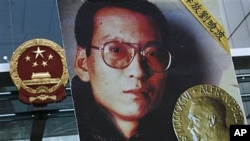China analysts say it still is unclear what impact the granting of the Nobel Peace Prize to Liu Xiaobo will have on the Chinese government, both domestically and in the international arena. What is clear, they say, is that the award will give a boost to those struggling for expanded freedoms in China and provide leaders an opportunity to perhaps rethink their policies.
News that Liu Xiaobo was the recipient of the 2010 Nobel Peace Prize may not have shocked the international community, but it has put China on the defensive. China has lashed out, angrily accusing the Nobel Committee of disrespecting the country's judicial system and canceling several meetings with Norwegian officials, both in Norway and in China. It has also closed the curtains on the performances in China of a musical from Norway.
The Nobel Committee is based in Norway and is a private organization.
Norway's foreign ministry said China's actions are inappropriate if they are retaliation over the Nobel Peace Prize award.
Cheng Li, the research director of the China Center at the Brookings Institution in Washington, D.C., said that while it is possible that China's angry responses could continue and spread, targeting other countries - it is most likely that Beijing will move on to other issues and stop talking about the prize.
"Generally speaking I don't think that it will continue for too long, and if they react too strongly it will resonate badly at home," said Li.
China has largely silenced any discussion of the award, giving only limited and negative coverage in state media.
Rebecca MacKinnon, an expert on China's Internet, said this has made it impossible for everyday citizens to even discuss the award online. "I've been trying to get a sense of how much people on the Chinese internet have been able to see in less official media - or in the blogs, in chat rooms and so on - and what we're seeing is that the Internet is being very heavily censored when it comes to people's efforts to get information or have conversations about Liu Xiaobo and his Nobel Peace Prize."
MacKinnon also said that when she actually took some articles about Liu Xiaobo's Peace Prize and posted them on a number of blogging sites in China, they were quickly taken off the Internet completely. "So this is happening a lot where somebody will post a comment or try to post a comment about Liu Xiaobo, and it will be deleted. And people in China who try to send text messages on their mobile phones about Liu Xiaobo's Nobel Peace Prize find that the messages get blocked. They end up just failing to send out the messages entirely."
Such heavy censorship, she said, is making it difficult for there to be a robust discourse about Liu and the award. "I've seen some people posting online on Twitter about how Liu Xiaobo was a U.S. government spy and this kind of thing. You certainly see these kind of comments floating around, then other people will criticize those people for being (Chinese) government shills."
Li said that on the one hand the award reinforces the perceptions of some in China that this is part of a Western conspiracy or American conspiracy against China. At the same time, however, he said it could have a positive affect on political reform in China in terms of respect for human rights and democracy.
"Chinese people usually think very highly of the Nobel prize, whether it be peace or in sciences," said Li. "Certainly it is a kind of way to make Chinese people, even Chinese leaders, rethink China's role in today's world. How to join the world, rather than depart from global development."
At the very least, Li noted that the award will give China an opportunity to reflect on its role in the international arena. "Two years ago China had a very good slogan for the Olympics called "one world, one dream." This is universalism. And certainly the awarding of the Nobel Peace Prize to Liu Xiaobo - although many people in China perceive it in different ways - but on the other hand Chinese people need to think about whether the outside world misreads China or China misreads the outside world."
MacKinnon said that while few may be getting information about Liu Xiaobo, the award is still making an impact. She said that impact isn't always measured by the number of people who know about something and is not always immediate.
MacKinnon said that at the very least, the award is having an effect on the several thousand people around China who took a risk and signed Charter 08 - the pro-democracy manifesto that Liu Xiaobo authored - and faced intimidation because of that.
"The fact that Liu Xiaobo has now won the Nobel Peace Prize and has received global acclaim for standing up for his beliefs," said MacKinnon. "To that group of people in China, who have been willing to take risks, in large and small ways, to advocate for at least a discussion about China's future and its alternatives, those people who have taken a risk to support his ideas, are feeling vindicated and feeling that their risk was not for naught."
Dai Qing, a fellow dissident in China agrees. Qing said the prize is not just for Liu because as the Nobel Committee has put it very clearly: he is a symbol. She said that in China there are many people who often are forgotten about, who are fighting and facing situations that are more difficult than Liu Xiaobo. Some of these people face much harsher situations. She added that to them, though, it does not matter, they are happy just the same that at least one has received the Prize.




